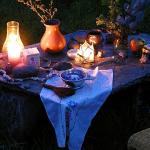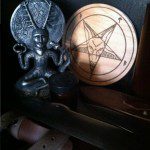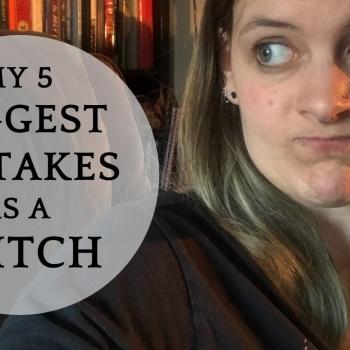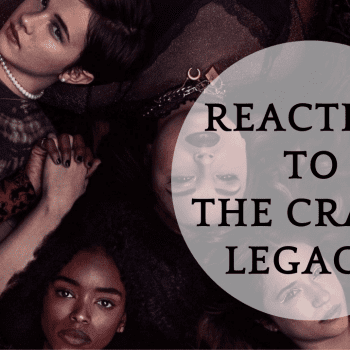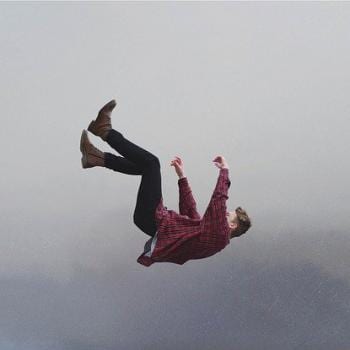 I’m watching various dramas unfold in my Pagan life right now, mostly having to do with community: A popular YouTuber converted (remember when that happened to a popular writer a few years ago?). Two Pagan Pride events in my state imploded. My conversations with peers are increasingly turning to “this new aesthetic, social-media-witchcraft that’s so popular right now.” Some of us are feeling a little threatened by the latest trends (when are we not?).
I’m watching various dramas unfold in my Pagan life right now, mostly having to do with community: A popular YouTuber converted (remember when that happened to a popular writer a few years ago?). Two Pagan Pride events in my state imploded. My conversations with peers are increasingly turning to “this new aesthetic, social-media-witchcraft that’s so popular right now.” Some of us are feeling a little threatened by the latest trends (when are we not?).
Fundamentally, this is all about change being scary.
Full disclosure: I’m an Army brat. As I think most brats will tell you, the process of moving, dealing with many (if not all) of your friends moving all the time, your parents periodically disappearing on some TDY trip (that’s “temporary duty” for you laymen), and a rotating cast of teachers, daycare centers, and nannies, can really mess with how you think about longterm relationships, “home,” and community. When you don’t know for sure where you might be in two years, or if you’ll see any of your friends the following school year, it’s less essential to get attached to the people around you. It’s one of the reasons for the “tribe” mentality of the various military branches. It’s certainly why I’m so close to my parents, no matter how different we may be sometimes.
I was really lucky in that I personally only had to move twice as a kid (and only once that really had any impact), but I did deal with all of those other things. I also moved a lot as a young adult. I transferred colleges, moved for a boyfriend, went to grad school, went back to college, and went back to grad school. All in different cities, and once in another state. Let’s just say I don’t do class reunions or belong to alumni associations.
I’ve been part of many different communities in my life, of all kinds. I don’t necessarily like it, but I handle change really well. It was required of me as a child, over and over. In fact, the biggest challenge of my thirties has so far been negotiating the care and feeding of longterm relationships.
I’m telling you this for context. I think it’s useful to know why people think the way they do, and these experiences heavily impact how I interact with my Pagan and witch communities.
I find that Pagan communities change particularly rapidly. Groups form, groups dissolve, events take off, events nosedive, stores open and close, projects and blogs and YouTube channels and popular authors come and go. Foxfire has been around for about five years, and that’s positively venerable for a Wiccan coven made up of all original members. Even when something survives for decades, the people working behind the scenes usually change. The open circle I attended in college was not the same open circle I visited the last time I passed through that part of Virginia, years later. The name was the same, but that was about it. The oldest surviving covens have had multiple high priestesses. The longest running festivals have a rotating cast of organizers, vendors, and attendees. They are always changing.
It can be sad, realizing that something has shifted and made your community different. It’s hard watching a favorite writer or teacher change their perspective, especially if they move toward something you don’t believe. Here in Pagan and New Age spaces, we’ve seen many conversions, and they’ve all wounded to some degree. Sometimes the new convert has something disparaging to say about your community, as sometimes happens with “ex-witch” ministries, for example. It’s particularly hard if betrayal is involved. When the change comes about because someone has wronged you and yours, that poses it’s own special challenges.
My own Charlotte community is coping with the loss of its Pagan Pride Day, as is Raleigh, for very different reasons. My coven has struggled over the years as individual members have tackled new jobs, new relationships (or changing ones), and new encounters with the gods. If our witchcraft works, this is the result: change.
When I am upset by community drama, changing people, and endings, I draw on some of the coping mechanisms I learned as a kid (because, though I’m rooted now, they’re still useful tools). I’d like to offer those here:
Your community is not the whole of you. It’s certainly not the whole of your magical practice. We come together because it can make us more powerful and because we love each other and we want to be challenged and inspired, but we all go home afterwards. We don’t take all of those people with us. And that means we all need to figure out who we are when we’re alone, even if we’re not alone very frequently (because, of course, a family is a community, too). When people leave, or communities disband, or movements end, we can keep pieces of them—internalize that magic—but we are still left. And we all have to do something afterwards. You can move forward or not; those are really your only choices. There’s a place to be angry and hurt, and there’s a time to complain and gossip and vent, but you have to keep going. You have to keep practicing what’s important to you and keep building new communities.
There’s also a great big world out there. When we’re absorbed in the drama of one group of people, it’s easy to forget that there’s a bigger picture. Pagans are great at talking about “the Pagan community” like that’s one thing, but it just isn’t. Right now, there’s a lot of people in my own local meatspace mourning “the Charlotte area Pagan community” because of the dissolution of our PPD. But the truth is that most of us weren’t involved and don’t actually have the full picture of what happened, and don’t even need or want that full picture. Most of us didn’t know the key players personally. For many, PPD was a nice day that happened once a year, and then we went home, where we continued to be part of our own communities. That doesn’t diminish the pain of the people who were close to the blast zone, but hopefully there is still comfort in the reality that much of “the community” actually wasn’t seriously impacted. If you weren’t following every word on Facebook, you might never even know. Covens still meet, circles still happen, book groups and meetups and solitaries still do their thing. This wasn’t a blow to “the community.” It was a blow to “a community.” A hard one, yes. We can all share in that pain. But Charlotte isn’t burning. It’s a lot easier to heal when you understand that the whole organism isn’t sick and you have other resources and support structures in place outside of your immediate circle.
Something similar happens when I travel to festivals and hear the whispers of organizer drama. Is it serious? Maybe. But as an attendee (probably from a different state), I only came for the workshops and the sunshine. So did most of the other people who showed up. They’ve got their own dramas playing out in other spaces (which is probably why they didn’t volunteer to begin with, not because they just don’t care about yours). Their perspective on “the community” is probably very different.
Likewise, fresh initiates are often disillusioned to find out that there’s drama built into their uplines. We like to think we’re above the stuff that plagues regular people in other kinds of communities. It’s part of why we can’t handle it when scandal arises, even though it always does.
When bad things happen in my communities, I try to remember that the world keeps turning. Maybe it’s a callous attitude, but I actually enjoy that feeling of smallness I get when I look at the night sky. I like knowing that my pain isn’t all there is, no matter what I’m dealing with. It’s part of how I got through my more destructive habits at the height of my depression. It doesn’t work for everyone, of course. But I take immense comfort in the knowledge that the world is a lot bigger than me and my immediate community. If Foxfire blows up someday, there will still be Gardnerians in the world and there will still be other covens and brilliant witches and the gods. There will be new events, new planning committees, new writers and teachers to love, and new friends to meet. There’s no singular “Pagan community,” which means there’s no way to destroy it.


